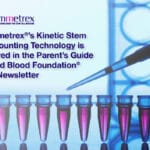The founder and director of stem cell biotechnology company Asymmetrex, James L. Sherley, M.D., Ph.D., continues to lead the company’s public service mission of disseminating timely scientific information on the qualities of tissue stem cells and their use for medical therapies. Most recently, in a July 20 invited essay posted on the Oncology webpage of ClinicalTrialsArena, Sherley recommended that Gene Therapy should be more appropriately called “Stemgene Therapy” to emphasize the essential requirement that therapeutic genes are targeted into tissue stem cells in order to achieve long-term cures.
Asymmetrex Proposes “Stemgene Therapy” to Emphasize the Importance of Tissue Stem Cells for Successful Gene Therapy
James Sherley heads a biotechnology company that offers a technology-enabled service to the fields of stem cell research, stem cell regenerative medicine, and drug discovery. Asymmetrex offers the first-in-kind technology for specific counting of adult tissue stem cells, which include blood stem cells and stem cells isolated from fat tissue. The company’s AlphaSTEM Test™ service determines the number of stem cells in research experiments, the stem cell-specific dose of therapeutic treatments, the quality of stem cells supplied by stem cell production companies, and drug candidates that are likely to cause organ failure.
Just as the inclusion of drug discovery on the list of AlphaSTEM Test™ services may seem odd to some, Sherley discovered that so did gene therapy and gene editing. Asymmetrex has been pursuing gene therapy and gene editing companies as prospective sponsors since the company’s AlphaSTEM Test™ technology became available. However, as Sherley observes in the featured ClinicalTrialsArena essay, in the high pace of medical development, there can often be surprising disconnects between scientific knowledge and clinical research practice.
When approached by ClinicalTrialsArena to provide an informational essay for contract research organizations (CROs) working to supply services to stem cell regenerative medicine sponsors, Sherley says, “I had been waiting for an opportunity to share our experience and suggest a solution to the disconnect Asymmetrex encountered between the recognition, in the scientific literature, of the importance of targeting stem cells for successful gene therapy and the widespread resignation, in gene therapy clinical trials practice, to not address this clear requirement with any specifically designed strategies.” This surprisingly agnostic approach seemed especially true of newly appearing gene editing companies.
“The ‘Stemgene Therapy’ Consideration”, posted July 20 on the Oncology page of ClinicalTrialsArena is an attempt by Sherley to bring more attention to this difficult to account shortcoming. His essay recommends that Gene Therapy is called Stemgene Therapy instead. This change would keep the importance of stem cells at the forefront of research and development for more effective gene therapies.
The success of long-term gene therapy depends on the introduction of therapeutic genes or gene edits into long-lived tissue stem cells. However, accomplishing such specific targeting is quite challenging, because tissue stem cells are vastly outnumbered and obscured by mature tissue cells that have short lifetimes in the body. The well-known difficulties of identifying, isolating, quantifying, and producing tissue stem cells that continue to limit progress in stem cell medicine also limit progress in gene therapy and gene editing. Sherley warns that not enough attention is given to these needs to improve the design of gene therapy clinical trials. Similarly, research dedicated to breaching these technical barriers to genetically engineering tissue stem cells falls short of the level of attention and resources warranted, given the crucial requirement of tissue stem cell targeting for attainment of durable gene treatments.
In addition to changing the name of the medical discipline, Sherley calls on CROs and their gene therapy sponsors to collaborate towards reducing the stem cell-related barriers that presently preclude more effective gene therapies. These key players may have to step outside of their conventional commercially-motivated interactions into more dynamic stem cell research collaborations in order to discover and engineer solutions to the stem cell challenges that presently limit progress in stemgene therapeutics.
Asymmetrex, LLC is a Massachusetts life sciences company with a focus on developing technologies to advance stem cell medicine. Asymmetrex’s founder and director, James L. Sherley, M.D., Ph.D. is an internationally recognized expert on the unique properties of adult tissue stem cells. The company’s patent portfolio contains biotechnologies that solve the two main technical problems – production and quantification – that have stood in the way of successful commercialization of human adult tissue stem cells for regenerative medicine and drug development. In addition, the portfolio includes novel technologies for isolating cancer stem cells and producing induced pluripotent stem cells for disease research purposes. Asymmetrex markets the first technology for determination of the dose and quality of tissue stem cell preparations (the “AlphaSTEM Test™”) for use in stem cell transplantation therapies and pre-clinical drug evaluations.







Leave a Reply